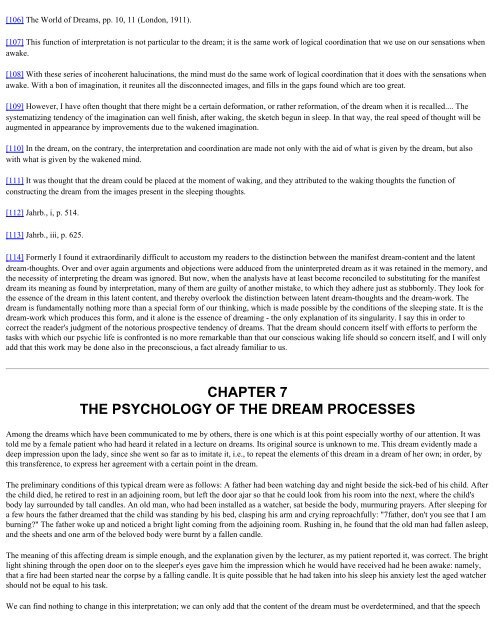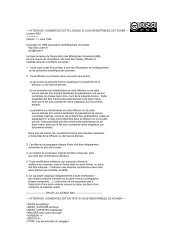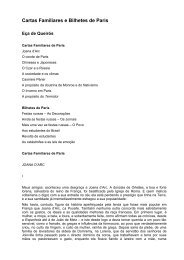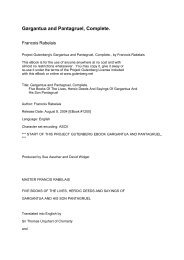The Interpretation of Dreams Sigmund Freud (1900)
The Interpretation of Dreams Sigmund Freud (1900)
The Interpretation of Dreams Sigmund Freud (1900)
Create successful ePaper yourself
Turn your PDF publications into a flip-book with our unique Google optimized e-Paper software.
[106] <strong>The</strong> World <strong>of</strong> <strong>Dreams</strong>, pp. 10, 11 (London, 1911).<br />
[107] This function <strong>of</strong> interpretation is not particular to the dream; it is the same work <strong>of</strong> logical coordination that we use on our sensations when<br />
awake.<br />
[108] With these series <strong>of</strong> incoherent halucinations, the mind must do the same work <strong>of</strong> logical coordination that it does with the sensations when<br />
awake. With a bon <strong>of</strong> imagination, it reunites all the disconnected images, and fills in the gaps found which are too great.<br />
[109] However, I have <strong>of</strong>ten thought that there might be a certain deformation, or rather reformation, <strong>of</strong> the dream when it is recalled.... <strong>The</strong><br />
systematizing tendency <strong>of</strong> the imagination can well finish, after waking, the sketch begun in sleep. In that way, the real speed <strong>of</strong> thought will be<br />
augmented in appearance by improvements due to the wakened imagination.<br />
[110] In the dream, on the contrary, the interpretation and coordination are made not only with the aid <strong>of</strong> what is given by the dream, but also<br />
with what is given by the wakened mind.<br />
[111] It was thought that the dream could be placed at the moment <strong>of</strong> waking, and they attributed to the waking thoughts the function <strong>of</strong><br />
constructing the dream from the images present in the sleeping thoughts.<br />
[112] Jahrb., i, p. 514.<br />
[113] Jahrb., iii, p. 625.<br />
[114] Formerly I found it extraordinarily difficult to accustom my readers to the distinction between the manifest dream-content and the latent<br />
dream-thoughts. Over and over again arguments and objections were adduced from the uninterpreted dream as it was retained in the memory, and<br />
the necessity <strong>of</strong> interpreting the dream was ignored. But now, when the analysts have at least become reconciled to substituting for the manifest<br />
dream its meaning as found by interpretation, many <strong>of</strong> them are guilty <strong>of</strong> another mistake, to which they adhere just as stubbornly. <strong>The</strong>y look for<br />
the essence <strong>of</strong> the dream in this latent content, and thereby overlook the distinction between latent dream-thoughts and the dream-work. <strong>The</strong><br />
dream is fundamentally nothing more than a special form <strong>of</strong> our thinking, which is made possible by the conditions <strong>of</strong> the sleeping state. It is the<br />
dream-work which produces this form, and it alone is the essence <strong>of</strong> dreaming - the only explanation <strong>of</strong> its singularity. I say this in order to<br />
correct the reader's judgment <strong>of</strong> the notorious prospective tendency <strong>of</strong> dreams. That the dream should concern itself with efforts to perform the<br />
tasks with which our psychic life is confronted is no more remarkable than that our conscious waking life should so concern itself, and I will only<br />
add that this work may be done also in the preconscious, a fact already familiar to us.<br />
CHAPTER 7<br />
THE PSYCHOLOGY OF THE DREAM PROCESSES<br />
Among the dreams which have been communicated to me by others, there is one which is at this point especially worthy <strong>of</strong> our attention. It was<br />
told me by a female patient who had heard it related in a lecture on dreams. Its original source is unknown to me. This dream evidently made a<br />
deep impression upon the lady, since she went so far as to imitate it, i.e., to repeat the elements <strong>of</strong> this dream in a dream <strong>of</strong> her own; in order, by<br />
this transference, to express her agreement with a certain point in the dream.<br />
<strong>The</strong> preliminary conditions <strong>of</strong> this typical dream were as follows: A father had been watching day and night beside the sick-bed <strong>of</strong> his child. After<br />
the child died, he retired to rest in an adjoining room, but left the door ajar so that he could look from his room into the next, where the child's<br />
body lay surrounded by tall candles. An old man, who had been installed as a watcher, sat beside the body, murmuring prayers. After sleeping for<br />
a few hours the father dreamed that the child was standing by his bed, clasping his arm and crying reproachfully: "7father, don't you see that I am<br />
burning?" <strong>The</strong> father woke up and noticed a bright light coming from the adjoining room. Rushing in, he found that the old man had fallen asleep,<br />
and the sheets and one arm <strong>of</strong> the beloved body were burnt by a fallen candle.<br />
<strong>The</strong> meaning <strong>of</strong> this affecting dream is simple enough, and the explanation given by the lecturer, as my patient reported it, was correct. <strong>The</strong> bright<br />
light shining through the open door on to the sleeper's eyes gave him the impression which he would have received had he been awake: namely,<br />
that a fire had been started near the corpse by a falling candle. It is quite possible that he had taken into his sleep his anxiety lest the aged watcher<br />
should not be equal to his task.<br />
We can find nothing to change in this interpretation; we can only add that the content <strong>of</strong> the dream must be overdetermined, and that the speech









